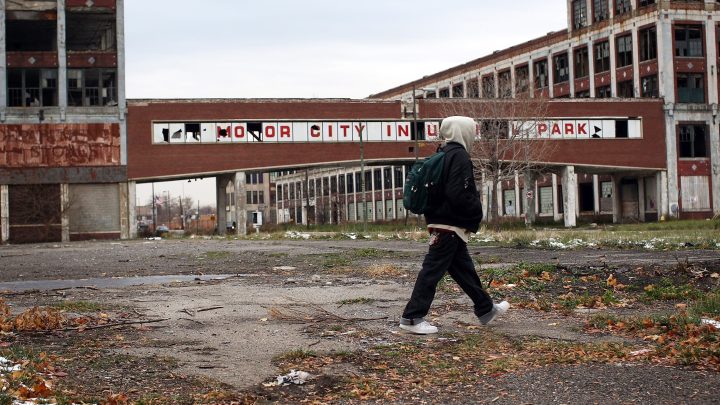
Midwest’s pollution is spurring a reverse Great Migration

For several months of the year, residents of wildfire-prone areas know they should expect poor air quality. They put on masks, stay indoors when it gets bad and avoid breathing in smoke or fine particles as much as they can. But what about when the air quality is always poor? Staying inside all day, every day, just isn’t an option.
According to reporting from the nonprofit news organization Capital B, pollution is pervasive in the industrial cities of the Midwest, and the effects are felt even more intensely in majority Black communities. As a consequence, Black families are leaving the region by the thousands.
Adam Mahoney is a national climate and environment reporter with Capital B. He joined Marketplace’s Kimberly Adams to talk about the new Black migration to the South and what can be done to reverse the trend. An edited transcript of their conversation is below.
Kimberly Adams: So which Midwest cities did you focus on for this piece? And why?
Adam Mahoney: Earlier this year, I traveled throughout the Midwest to report on the Black exodus from a lot of the biggest, once-industrial hubs in that region. So we focused on Chicago, Detroit; Gary, Indiana; in addition to St. Louis and Cleveland, Ohio.
Adams: Can you make the connection for me between these industrial hubs and pollution and what your story is actually about, which is migration?
Mahoney: You know, as most folks know, during the first Great Migrations, between 1910 and 1970, millions of Black folks left the South towards northern cities, towards Midwestern cities. And a lot of folks settled in these growing industrial hubs, and a lot of these industries kind of thrived on Black labor, right? They were able to underpay Black workers while, you know, Black folks were struggling through these kinds of treacherous working conditions. And all the while that was happening, as we now know, these industrial facilities were kind of destroying Black communities with pollution, whether it be from, you know, air sources or water contamination, soil contamination. And once these industries slowly started to die off, it left Black communities kind of trapped — one, without the economic security now, but also with that industrial pollution and the fallout with that in terms of health outcomes. So what we found is that, in the Midwest, despite Black folks only making up 10% of the Midwestern population, they make up roughly a third of those living in communities that are deemed quote-unquote “disadvantaged” by environmental injustice, by pollution and contamination. So that’s a big disparity. A lot of those environmental harms and those health outcomes have kind of led to the Black exodus from these cities as people try to move away from those harms.
Adams: And where are people going?
Mahoney: Yeah, it’s a little ironic. Right now, the South is the only region in the United States where more Black people have moved to than from since 2000. A lot of those growing hubs are places like Atlanta [and] Charlotte, North Carolina. And I say it’s ironic because as folks are leaving the Midwest to escape these environmental harms, they are kind of running towards the epicenter of climate change. And a lot of these growing hubs are places that are constantly hit by climate disasters, and not to mention they have their own environmental and pollution harms there as well.
Adams: What are some of the long-term implications of this, especially for the communities left behind?
Mahoney: I mean, we’ve seen pretty stark and deep fallouts already. I can just use Gary, Indiana, as an example, which was a city that was literally built by and for industry. It was founded by the U.S. Steel Corp., which at the time was the largest corporation in the world. And once that steel production declined and those jobs left, that kind of created this vast hole where now Gary has been dealing with bankruptcy for well over a decade, gun violence has risen, poverty has risen. So all of those ills that kind of mark a divested community were exactly born out of that process of deindustrialization that was once driven by the migration of Black folks.
Adams: What do you think needs to happen? Especially, you know, when it comes to regulations around this stuff, to actually make a difference? Or is this just a trend that’s gonna happen?
Mahoney: I think there are a lot of factors at play. We live in a system still, in terms of environmental regulations, where industry and capital kind of dictate progress in terms of lowering pollution. I think at the end of the day, and which a lot of activists and community organizers shared to me, is that, really, the only way to guarantee safe and healthy communities is to have these polluting industries not exist there. And that obviously has everything to do with our shift to renewable energy. But really, at the end of the day, that is what folks are pushing for, is for clean jobs in their neighborhoods, and, you know, not to be overburdened by pollution at the end of the day.
There’s a lot happening in the world. Through it all, Marketplace is here for you.
You rely on Marketplace to break down the world’s events and tell you how it affects you in a fact-based, approachable way. We rely on your financial support to keep making that possible.
Your donation today powers the independent journalism that you rely on. For just $5/month, you can help sustain Marketplace so we can keep reporting on the things that matter to you.

















